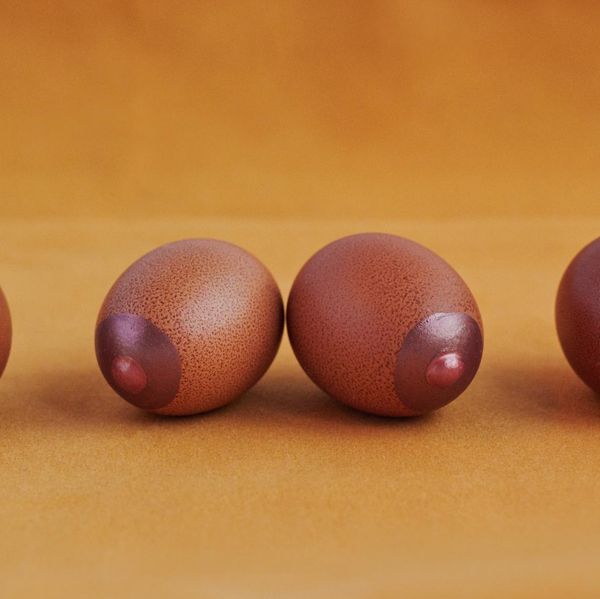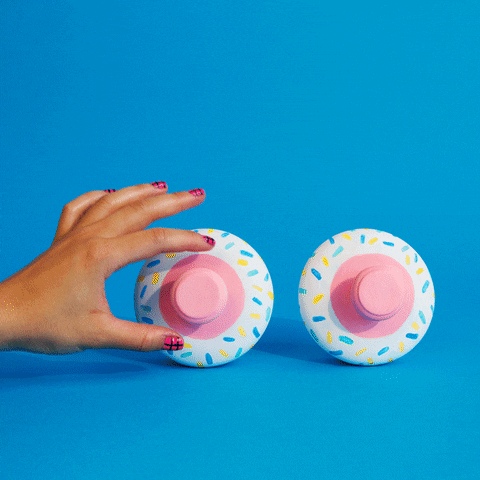
I've written about breasts on here before. Foods that are good for your breasts. How to pamper your breasts. Even tips for how to keep your breasts looking as youthful as possible. Yet while I was actually giving myself a breast exam not too long ago, I thought about how nipples don't seem to get as much attention (or media love) as breasts, as a whole, do. I mean, we've all got 'em and they certainly serve a purpose. So, let's explore a few facts about nipples that will hopefully help you to gain a greater appreciation for the ones that you have.
1. They’re One of the First Things to Develop in the Womb

It really is a trip, just how much a baby develops, very early on. For instance, by the time an expectant mom is in her ninth week of pregnancy, her child is already starting to form arms, toes and organs. Another thing that pops up are nipples and hair follicles, making nipples one of the first things that fully develops within a mother's womb.
2. They Are Sisters, Not Twins

If you were to draw a line straight down your body from head to toe and then looked very carefully at each of your body parts, you'd probably notice that while things like your eyebrows, eyes, ears, hands, feet, etc. look very similar, they aren't exactly identical. This point applies to your breasts and most certainly your nipples. One might be larger or higher than the other—and you know what? That's totally OK.
That said, what I will throw in is, something that I found to be a trip, is if you wanted to "measure" the space between both of your nipples, they're basically the same distance apart as your earlobes are. The more you know.
3. Some Folks Have More than Two of ‘Em

For the record, just like your vagina and labia aren't exactly the same thing (your vagina is the tube that connects to your uterus while your labia are your outer lips; both ultimately make up your vulva) neither are your nipples and your areolas. Your nipples are at the very center of your breasts that connect to your mammary glands. Your areolas are the darker part of your skin that surrounds your nipples. Well, depending on how your mammary glands are designed, it's actually very possible for you to have a couple of nipples on each areola. Health-wise, it's not that big of a deal, although it could make breastfeeding a little challenging for your baby.
4. They Resemble Belly Buttons. Kinda.

Now, here's what I mean when it comes to this particular point. Believe it or not, there are several different kinds of nipples. Like belly buttons, some women have nipples that protrude out (an outie) while others have inverted ones (an innie). Then there are women whose nipples remain pretty flat (even when they are aroused), women with multiple ones and even some who have nipples that look somewhat divided in the middle. Oh, and remember what I said about how no two nipples are exactly alike? This means that it's also probable that a woman could have one inverted nipple while the other protrudes. Nothing is wrong with any of these dynamics. It's just one more thing that speaks to how unique each of us are.
5. The Bumps Are There for a Reason. And a Purpose.

Ever wonder why your nipples have those little bumps all over them? It's not some random freak of nature.
The technical name for them are Montgomery tubercles and what they do is secrete oil to keep your nipples moisturized.
The secretions increase, significantly so, while you are pregnant. When it comes to these, some women only have a few of these bumps while other women have many.
6. Human Nipples Differ from Other Mammals

A fun fact that I found to be interesting is while our nipples (male and female) are able to remain prominent and become erect for as long as we're alive, other mammals only appear to have nipples during pregnancy and lactation. It could be nature's way of cosigning on the fact that humans become stimulated and have sex for more reasons than just being "in heat" and procreating, since nipples are an erogenous zone 'n all.
7. There’s a Scientific Reason for Having “Headlights”

Most of us know that when we get cold or aroused, our nipples typically get hard (become erect). The main reason why is because nipples have a collection of nerve cells that basically control the erectile muscle that's inside of your breast tissue. And the more sensitive those nerves are, the more likely your nipples (some call them "headlights") are going to show. While you need to give hard nipples time to warm up or to come down from being aroused in order for them to blend back in with the rest of your breasts, if you want to prevent hard nipples from being seen in public, a padded bra should do the trick (for the most part, anyway).
8. Discharge Is Pretty Normal. However…

Believe it or not, having a bit of nipple discharge can be pretty normal/common prior to menopause. That's because, contrary to popular belief, discharge doesn't only happen when you're pregnant. Birth control pills, nipple stimulation, antidepressants (because they can trigger the production of prolactin which is a milk-producing hormone) and shifts during your cycle can also cause discharge to come out of one or both of your nipples. However, because it could also be a sign of breast cancer, if you're getting discharge all of a sudden and/or the texture or amount has increased, talk to your doctor about it. Just to be on the safe side.
9. Nipples Shouldn’t Be Inflamed

The more I study the body, the more I realize that inflammation, anywhere, is problematic. Nipples are certainly not exempt. If you happen to notice that yours are red, painful or even super warm whenever you touch them, that could be a heads up that you've got either mastitis (a blocked milk gland) or possibly even breast cancer. Bottom line here is, don't ignore it. Make an appointment to see your doctor as soon as possible. (By the way, if your nipples are constantly dry and nothing seems to relieve them, that also could be an indication of breast cancer; another reason to book an appointment with your physician.)
10. Stimulating Nipples Can Help to Induce Labor

Something that I learned while training to become a doula is stimulating your nipples when you're right around your due date can actually help to induce labor. The reason why is when nipples are touched/rubbed on, it increases the production of oxytocin which can help to trigger contractions. Matter of fact, women who have their nipples stimulated during this time tend to have shorter deliveries and less pregnancy complications too. While we're here, it should also go on record that nipples can change color during pregnancy. And, it's not uncommon for a breastfeeding mom to lactate whenever she hears a baby (any baby) cry.
11. Think Long and Hard Before Getting Them Pierced

So, here's the thing about getting one or both of your nipples pierced—they come with more cons than pros.
Let's do the cons first, shall we? Getting them pierced is pretty painful (the healing process takes around eight weeks). Switching them out can prove to make things worse in the long run (the new earring may not go all the way in and/or it can be as painful as the original piercing). Some people are still cleaning theirs, months later, before foreplay (due to the crusting that continues to accumulate). Because your bra is rubbing up against your piercings for hours on end, you are constantly at risk for an infection. Then there's the scar tissue (especially if you're someone who is prone to keloids); it can affect the shape, size and sensitivity of your breasts.
OK, so what the heck are the pros? Well, it can definitely take arousal levels up a few notches. Oh, and if you're wondering if you'll still be able to breastfeed, most health care experts and piercers say "yes".
12. Nipplegasms Are Very Real

I once read an article on Live Science's site that was entitled, "Nipples 'Light Up' Brain the Way Genitals Do". I'm thinking that when it comes to my final nipple fact, the point is pretty self-explanatory. Because our nipples have a lot of nerves in them, that makes them really sensitive. And so, when they are fondled/caressed/licked/etc., that can result in us climaxing, just from the stimuli alone. If you've never had one before and want to test this out, while there are no guarantees, deep breathing, lots of foreplay and intentional attention given to your nipples can certainly help. And shoot, even if it doesn't happen, you at least had a damn good time trying. Right?
Join our xoTribe, an exclusive community dedicated to YOU and your stories and all things xoNecole. Be a part of a growing community of women from all over the world who come together to uplift, inspire, and inform each other on all things related to the glow up.
Featured image by Getty Images
- When To Start Breastfeeding - xoNecole: Women's Interest, Love ... ›
- 10 Ways To Love On And Pamper Your Breasts - xoNecole ... ›
- Signs You Should Reconsider Getting Nipples Pierced - xoNecole ... ›
- I Tried It: Misses Kisses Frontless Bra Review - xoNecole: Women's ... ›
- Signs You Should Reconsider Getting Nipples Pierced - xoNecole: Women's Interest, Love, Wellness, Beauty ›
- Breast Foreplay: Tips For All You Need To Know - xoNecole: Lifestyle, Culture, Love, Wellness ›
This Is How To Keep 'Holiday Season Stress' From Infecting Your Relationship
Hmph. Maybe it’s just me, but it seems like there is something really weird happening in the fall season air (because winter doesn’t officially begin until December 21) that cuddle season is in full swing while break-up season is as well. In fact, did you know that break-ups are so popular during the holiday season that December 11 is deemed Break-Up Day?
The reasons why relationships shift around this time vary; however, I did both roll my eyes and chuckle when I read that a very popular one is because it’s an easy way to get out of getting one’s significant other a Christmas present. SMDH.
Anyway, I personally think that the less shallow folks out here may contemplate calling things “quits” or they at least distance themselves a bit from their partner (and what I’m referring to is serious relationships) due to all of the stress and strain that oftentimes comes with the holidays whether it be financial, familial, due to their tight schedules or something else.
Listen, I would hate for you and your man to miss the fun and happiness of experiencing this time of year, all because you are so overwhelmed or irritated that you can’t really enjoy it. That’s why I have a few practical tips for how to avoid allowing the typical holiday season stress from INFECTING your relationship.
Manage Your Expectations
 Giphy
GiphyUnmanaged expectations. If there is a main reason why the holiday season tends to be so stress-filled for so many people, I’d bet good money that this is the cause. And when you’re in a long-term relationship, expectations can manifest themselves in all sorts of cryptic and/or unexpected ways. You might have relatives who assume that you are going to be with them for Thanksgiving or Christmas when you have other plans in mind. You might be thinking that you are going to spend one amount for presents while your man is thinking something totally different. When it comes to scheduling, your signals may be crossed.
And you know what? To all of these scenarios, this is where clear and consistent communication come in. Don’t assume anything. Don’t dictate anything either. From now until New Year’s, mutually decide to check in once a week, just to make sure that you are both on the same page as it relates to the holidays and what you both are thinking will come along with it. The less blindsided you both feel, the less stressed out you will be. Trust me on this.
Set (and Keep) a Budget
 Giphy
GiphyOkay, so I read that last year, 36 percent of Americans incurred some type of holiday-related debt. Hmph. Last year, there was still some sense of normalcy in this country, chile, so I can only imagine what finances are gonna look like over the next several weeks. That said, since I don’t know a lot of people who don’t find being broke stressful, make sure that you and your bae set a budget and then stick to it this year — no ifs, ands or buts.
Because really, y’all — it doesn’t make sense to deplete savings and/or max out credit cards for a few days of giggles only to be damn near losing your mind because you don’t know how to make ends meet come Dr. Martin Luther King, Jr. Day.
And by the way, this tip doesn’t just speak to things like food and gifts; I also mean travel. If it doesn’t make a ton of sense (or cents) to be all over the place this year — DON’T BE.
Keep Matthew 5:37 at the Forefront
 Giphy
GiphyIf off the top of your head, you don’t know what Matthew 5:37 says, no worries, here ya go: “But let your ‘Yes’ be ‘Yes,’ and your ‘No,’ ‘No.’ For whatever is more than these is from the evil one.” That verse right there? Oh, it’s a boundaries lifesaver! I say that because do you see “maybe” or “I’ll think about it” in there? Nope. LOL. It says that you should tell people “yes” or “no” and leave it at that — and that complements Anne Lamott’s quote, “’No’ is a complete sentence” impeccably well. Yeah, you’ve got to remember that anything beyond a yes or no to a request is privileged information; you don’t owe anyone details or an explanation.
Besides, if you are really honest with yourself, when someone asks you something and you give a “Umm, let me think about it” kind of reply, more times than not, you already know what your answer is going to be — so why not let you both off of the hook? Give your response. Commit to that. And let everyone (including yourself) get on with their lives and schedules.
I promise you that when it comes to those holiday parties, you are pissing more folks off by not RSVP’ing or doing so and not showing up than just saying, “Thank you but not this year” off the rip.
Remember That Your Personal Space Is Privilege Not a Right
 Giphy
GiphyA friend of mine recently bought a new house and invited me over to come see it. He’s a single man with no children, so as I was taking in all of the space that he had, especially as I walked through his finished basement, I joked about relatives coming to live with him. “Hell no” and “absolutely not” were pretty much his immediate responses as he went on to say that some folks even had the nerve to be offended when he told them that he had no intentions on taking DNA in.
Ain’t it wild how people think that your stuff is their right? And yes, that brings me to my next point. Your home is your sanctuary space. If you want to host folks this year — cool. If not, ALSO COOL. Please don’t let folks (family included) guilt you into how they want you to act or even into what they would do if the shoe was on the other foot. You are not them — and as one of my favorite quotes states, “If two people were exactly alike, one of them would be unnecessary.” (A man by the name Larry Dixon said that.)
Hell, my friends? They know that I am good for sending them random things that they need or even want all throughout the year. Coming over to hang out at my pace, though. Uh-uh. Chalk it up to being a card-carrying member of the ambivert club yet I like keeping my living space personal — and I sleep like a baby, each and every night, for feeling that way.
Always remember that your space, your time, your resources, your energy and shoot, yourself period (including your relationship), are all things that are your own. You get to choose how, when and why you want to share them. The holiday season is certainly no exception.
Cultivate Some “You Two Only” Traditions
 Giphy
GiphyIt’s not uncommon for some couples to hit me up after the holiday season to “detox.” Sometimes it’s due to the financial drama (and sometimes trauma) that they experienced. Sometimes it’s because they allowed their relatives (especially in-laws) to get more into their personal business than they should’ve. More than anything, though, it tends to be because they didn’t get enough quality time together and so ended up feeling “disconnected.”
Please don’t let that happen. Listen, I’m not even a holidays kind of woman and yet, I will absolutely sit myself down with some hot chocolate and chocolate chip cookies to enjoy a Hallmark holiday film or two. Aside from the fact that most of them are lighthearted and sweet, I also like that they usually focus on couples loving on each other amidst all of the holiday beauty and ambiance — which is something that all couples should set aside some time to do.
Maybe it’s a vacation. Maybe it’s a staycation. Or maybe it’s my personal favorite, A SEXCATION. Whether it’s for a few days, the weekend or even overnight — don’t you let the holidays go by without setting aside time for you and your man to celebrate one another. Don’t you dare (check out “Are You Ready To Have Some Very Merry 'Christmas Sex'?”).
GET. SOME. REST.
 Giphy
GiphyI once read that 8 out of 10 people get stressed out over the holidays and 3 out of 10 lose sleep during to it — and when you’re stress-filled and sleep-deprived, that can absolutely lead to hypersensitivity, making mountains out of molehills and even not being in the mood for sex.
Your relationship can’t afford to go through any of this, so definitely make sure to prioritize rest. I don’t care how unrealistic it might seem during this time, sleep should never be seen as a luxury; it will always and forever be a great necessity.
That said, try to get no less than six hours of shut-eye in (check out “6 Fascinating Ways Sex And Sleep Definitely Go Hand In Hand”) and even ask your bae to take a nap with you sometimes (check out “Wanna Have Some Next-Level Sex? Take A Nap, Sis.”). Not only will sleep help to restore your mind, body and spirit but, when it’s with your partner, it’s an act of intimacy that can make you both feel super connected, even in the midst of what might feel like chaos.
___
Holiday season stress is real. Still, never give it the permission or power to throw your relationship off. Put you and your man first and let the holidays be what they are gonna be, chile.
Let’s make things inbox official! Sign up for the xoNecole newsletter for love, wellness, career, and exclusive content delivered straight to your inbox.
Featured image by Shutterstock
Dreaming Of A White Christmas? These 7 Winter Wonderland Destinations Are Perfect For The Holidays
While most people opt for a tropical vacation during the winter months, there are still many people who want to fulfill their winter wonderland fantasies, which are more than likely centered on watching snow by the fireplace while sipping some hot cocoa.
With Thanksgiving vastly approaching and Christmas a little under a month away, there is still time to ditch the traditional Christmas home to visit family or friends.
Whether you’re looking to put a new stamp on your passport and keep things domestic with a destination in the States, xoNecole has you covered with a few hotspots for those itching to go somewhere cold (but with cozy vibes) this holiday season.
Aspen, Colorado
Our Christmas queen, Mariah Carey, has been taking an annual trip to this snowy destination since 1997, just three years after dropping the track that would make her the unofficial (but official to us) ambassador of the winter holiday.
Aside from being a key vacation spot for one of the culture’s greatest musicians, Aspen also offers travelers access to world-class skiing and snowboarding and four distinct mountains that provide the perfect backdrop for a winter vacation.
Whistler, British Columbia, Canada
Home to the largest ski resort in North America, Whistler Blackcomb, this destination is located in the Coast Mountain Range and is about 75 miles north of Vancouver.
From luxury spas like Scandinave Spa Whistler to Olympic Park, this is another top winter vacation spot that offers a unique experience for people who love snow and the thrill of a good adventure.
Western Massachusetts
Dubbed the place for a magical holiday escape, Springfield, Massachusetts, blends the warmth of small-town charm with unforgettable experiences like Grinchmas at Springfield Museums, Winterlights at Naumkeag in Stockbridge, Historic Deerfield’s Winter Frolic, and many others.
This destination offers something for all ages, and it’s close to home, making it all the more reason to place on your radar for a winter getaway.
Rovaniemi, Finland
If you want to really get into the Christmas spirit, this just may be the place for you. As the official home to Saint Nick himself, Rovaniemi, Finland offers reindeer sleigh rides, the opportunity to stay in a glass igloo, as well as an opportunity to experience the Santa Claus Village.
Lake Tahoe, California/Nevada
Who says that visits to the lake house are only reserved for summer vacation? A winter trip to Lake Tahoe is equipped with stunning lake views and top-notch ski resorts, including Heavenly and Northstar.
Chamonix, France
Sitting at the base of Mont Blanc, Chamonix, France, is known for its skiing and mountaineering. This destination is home to the Aiguille du Midi cable car, the charming Alpine village, and is also close to various other European ski destinations.
Northeastern Pennsylvania
This area of the U.S. state is home to the Poconos Mountains, whose renowned ski resorts include Camelback Mountain, Blue Mountain, and Jack Frost Big Boulder. Whether you’re a ski expert, a beginner, or just there for the vibes, this destination makes for a winter vacation that balances fun adventures and cozy getaways. Additionally, Pennsylvania is home to the Christmas Tree Capital of the world.
Feature image by Shutterstock
Originally published on November 23, 2024









